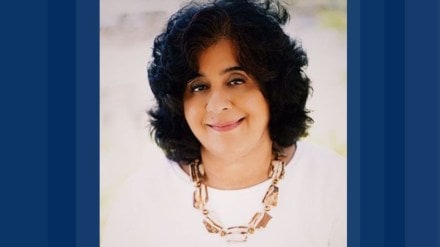The markets are interestingly poised. On the one hand, the Nifty is playing hide-and-seek with 26,000 levels despite encouraging macros and earnings, and on the other, there is an IPO boom of the size never seen before. Many of these IPOs, like the recently listed Lenskart, even raised concerns about long-term value.
The investor often remains confused about what they should invest in. Is it worthwhile to make the ‘trend your friend’? FinancialExpress.com’s Rahul Goel caught up with Devina Mehra, Founder, chairperson and Managing Director of First Global, for an exclusive conversation on all of these key questions.
#HappeningNow | Lenskart and the IPO Frenzy: Is the Bubble Set to Burst? Tune in!https://t.co/7aKJ47e81d
— Financial Express (@FinancialXpress) November 10, 2025
Here are Devina Mehra’s top 6 mantras on markets, IPOs, gold and a lot more.
#1 Lenskart outlook: Demand not an indicator or value
Addressing the biggest elephant in the room – Lenskart, its valuation and its day one listing performance – Devina Mehra pointed out that “one-day performance is not indicative of anything. One thing to remember for any IPO is – the demand for an IPO has very little to do with how it will perform after listing.”
She put out two contrasting examples to elucidate her points. “The poster boy for that is Reliance Power. There was so much demand, and eventually that stock went to zero. But even if you don’t take extreme examples like that and look at some other counters like DLF – as a company it has been operating reasonably well, with no serious disruption in business – it also listed at a premium and remained at that level for a while, but after that it didn’t see that kind of pricing for decades.”
She also pointed to an exact opposite case and said, “The biggest contra-example is Infosys. It was under subscribed. However, this is a company that created significant wealth in the market, and its IPO was undersubscribed.”
She cautioned investors that, “Whenever there is an IPO frenzy, as an investor, it is not a good time to invest in it. It rarely makes sense to invest. This is because most of the IPOs would be at stretched valuations.”
#2 IPO Boom: ‘Don’t usually end well’
We are undeniably in the midst of one of the biggest IPO boom periods in history. When asked how investors should approach this period, Mehra pointed out that “the IPO booms usually do not end well. If you look at the listings in October/November 2021, most haven’t given returns anywhere near the index returns yet, and 4 years have passed. Sometimes there is time correction or price correction – but some things just don’t make sense. Also, just because some stock falls from the IPO price, it doesn’t become a good Buy either.”
#3 How to look for value in IPOs
She pointed out that when there is a big bull market in IPOs and there are many IPOs, “it is difficult to find value. However, there have been many listings that created value. IPO is not a dirty word. The point to remember is there is no separate way to value an IPO company Vs listed company. The cardinal metric continues to be profit/cash flow.”
She believes that any other new metric is “never really a way to value a company but more of a way to justify valuation. Very sceptical about that.”
#4 Markets: No risk of crash but asset allocation important
That brings one to the cardinal question, how should one invest, and what’s the basis of allocation across asset classes? According to Devina Mehra, “First of all, I would suggest asset allocation and don’t have 100% in equity. But to the extent, whatever is the defined equity allocation, remain invested. I don’t see any great risk of a crash right now. The earnings cycle is seeing an uptick. Consumption has been accelerating for the past year. Other factors like inflation have come down, crude has cooled off.”
Though she had initially expected an earnings uptick in Q2, she pointed out that the “GST, while overall was a positive, was a disruption for the second quarter. Therefore, the earnings improvement got pushed to the third quarter.”
According to her, “earnings are on a bit of uptick. PE ratios are not too high on relatively subdued earnings. But that said, money that you put in equity markets should be the money you don’t need for 8-10 years. That’s why 100% should not be in equity.”
#5 Gold: ‘No safe haven’
Gold, given the recent price spike, been at the centre of many investment discussions. However, Mehra believes that “Gold is no safe haven, not at least in dollar terms. Gold is more volatile than equities. Gold should be part of asset allocation but should not be a big part. It cannot be that you have 25% in Gold. Gold and silver together can form a part of your portfolio but in single digit.”
#6 Importance of global investment
Mehra also highlighted the importance of investing globally. “If you have to diversify, investors now have options to invest globally. At least over a period of time have 30-40% of your money invested globally, and ‘globally’ doesn’t mean only the US,” she added.
Overall, Devina Mehra highlighted the importance of measured wealth creation and asset allocation. She expects an earnings uptick in the ongoing third quarter and reassures investors that there is no great risk of a crash in the market.
